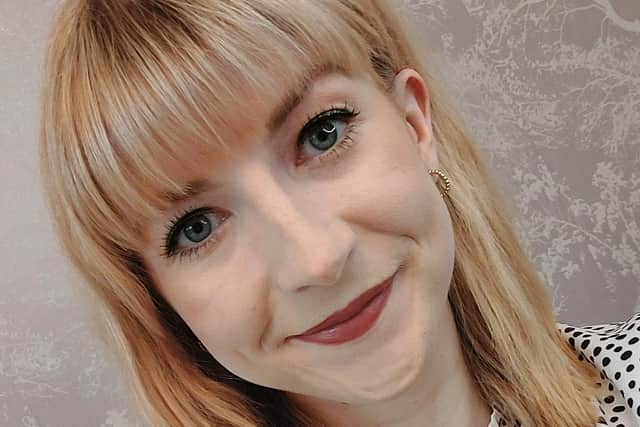'It feels like sitting on a knife': Doctors take 14 years to diagnose Northampton woman with endometriosis
and live on Freeview channel 276
A Northampton woman is calling for more awareness of endometriosis, after living with the "excruciatingly painful" symptoms for 14 years before doctors took her seriously.
Becca Hamson, 28, from Kingsthorpe was 13 years old when she started her period and began to experience her first symptoms of the condition.
Advertisement
Hide AdAdvertisement
Hide AdShe said: "It was excruciatingly painful. Sometimes, I would be physically sick and I would spend lunchtimes at school hunched over.


"Doctors told me it's normal and just cope with it like everyone else, so I thought it was normal and I was just being dramatic and I just can't cope like other people."
Becca began to experience other symptoms including severe constipation, bleeding when she went to the toilet and sharp stomach pains whenever she consumed food.
This made her resort to frequently skipping lunch because she did not want to be in pain at school.
Advertisement
Hide AdAdvertisement
Hide AdDoctors - over the years - were very "dismissive" of Becca's concerns and put her symptoms down to period pains, anxiety and stress from exams.
Becca said: "I was experiencing severe pelvic pain - like shooting and stabbing pains. If you sit on a knife, that is what it feels like. The pain was coming up beneath me.
"Doctors were very dismissive saying I had anxiety. When I am having bowel movements and blood, that is a physical thing that is happening to me. I was made to feel that it was just in my head and I was exaggerating."
In March 2020 - when the UK was in its first national lockdown - Becca's condition worsened significantly to the point where it was having a negative impact on her day-to-day life. She was phoning her GP every week telling them that something was "really wrong" and they needed to get to the bottom of this.
Advertisement
Hide AdAdvertisement
Hide AdBecca claims that doctors responded by telling her they could not refer her to gynecology because of the pandemic.
She recalled being in so much pain when getting a smear test once and claims that the gynecologist responded to this by telling her that she needs to "pull herself together" and asking, "if your husband wants children, how are you going to cope with that if you can't cope with a smear?"
Things came to a peak in summer 2020 when Becca woke up one morning in agony.
Recalling that day, Becca said: "I was just so so poorly to the point I was losing consciousness. My ears were ringing and I could not hear. My husband called 111 and they asked me to come in. When I got there, they said you must be constipated or it must be period pains. They told me to just go home.
Advertisement
Hide AdAdvertisement
Hide Ad"That is why I want to raise awareness because that actually happens to other people and that is obviously not okay."
Becca was eventually able to get her diagnosis when her boss overheard her talking about how she was suffering at work and he recommended she go through her work's private healthcare policy.
A gynecologist recognised the signs and symptoms of Becca's endometriosis at her first appointment.
Endometriosis is a condition where cells similar to the lining of the womb is found in other parts of the body. These cells react in the same way to those in the womb, building up then breaking down and then bleeding once a month.
Advertisement
Hide AdAdvertisement
Hide AdThe blood from the cells in the womb leaves the body in the form of a period. The bleeding from cells found in other areas of the body, however, has nowhere to go. This causes inflammation, pain and the formation of scar tissue.
Endometriosis can additionally cause chronic pain, fatigue, depression, problems with sex drive, an inability to conceive and difficulty in fulfilling work and social commitments.
Becca has since undergone two laparoscopies - a keyhole surgery that allows a surgeon to access the inside of the abdomen and pelvis.
The first surgery had to be done to officially diagnose Becca with the condition. Becca's second surgery was carried out in Oxford and involved cutting out some of the abnormal cells from her kidneys, bladder and uterus.
Advertisement
Hide AdAdvertisement
Hide AdShe now visits John Radcliffe Hospital in Oxford once a month for physiotherapy sessions.
There is no cure for endometriosis.
Becca strongly believes there needs to be more awareness about endometriosis both across the medical profession and in schools. She is speaking out about it now as March 1 sparks the start of endometriosis awareness month.
She said: "I think people need to realise that it affects much more of your body than your reproductive system.
"For GPs, there should be more education on it. My practice has since run a training programme for all the other GPs to know what needs to be done and how to spot signs of endometriosis.
Advertisement
Hide AdAdvertisement
Hide Ad"I think there should be more education in schools and teachers need to tell you how bad a period can be - not to scare the children but to raise awareness of what is and isn't normal."
Becca added: "It wasn't until I was having a conversation with my best friend and I said oh, you know how it hurts so much when you have to crawl back to your room after going to the toilet and she looked at me like I was crazy and she told me, no, that is not normal."
According to Endometriosis UK, the condition affects one in 10 women and those assigned female at birth in the UK.
Find out more by visiting https://www.endometriosis-uk.org/.